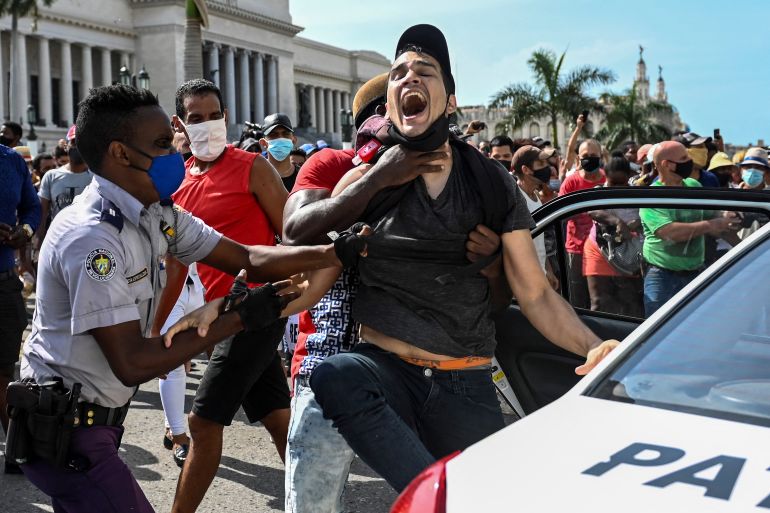Cuba calls National Defence Day on date of planned protests
Organisers say the government is militarising the country for the upcoming civil liberties demonstrations.

Cuba has announced it will conduct annual military exercises on the date of planned human rights protests around the country.
A brief armed forces communique published in state-run media on Friday has said the country will conduct annual military exercises on November 18 to 19, leading up to a day of civilian defence preparedness on November 20.
Keep reading
list of 3 itemsCuba protests: The economic woes driving discontent
Fake news proliferating online during Cuba protests
That is the same date dissident groups are planning nationwide demonstrations calling for civil liberties, including the right to peaceful protest and an amnesty for imprisoned government opponents.
The largest protests the island nation had seen in decades broke out for two days in July, resulting in hundreds of arrests, one death and calls for US intervention by some Cuban Americans.
Well-known government opponents are among those who remain behind bars following the July 11-12 unrest, with some facing long sentences.
The upcoming protests are being planned on Facebook by the Archipelago group, which says it has some 20,000 members, many of whom live outside the country.
The government’s defence preparations are part of a military doctrine known as the “War of the Whole People” designed to respond to a US invasion.
The last day features thousands of civilians conducting exercises including evacuating work centres, tending to the wounded, engaging in weapons training, and training in logistical support such as making bullets and cooking.
‘Further militarise the country’
Playwright Yunior Garcia, administrator of Archipelago and leader of the planned protests, tweeted that the date of the military exercises showed the government intended to “to further militarise the country” for November 20.
Unlike during the July unrest, which was largely spontaneous, the group has requested permission for marches in various cities on November 20, to which the government has yet to respond.
“Faced with the civility of our march, they respond with the threat of arms. Why so afraid that people will speak their minds?” Garcia said.
Authorities in Cuba have accused protesters and opponents of working with the US, which has imposed a 20-year embargo on the island in hopes of overthrowing the government.
But many who took to the streets in July said they were spurred by domestic issues.
Residents have faced food, medicine and other shortages amid coronavirus lockdowns and a severe blow to the tourism industry. Many have also endured long lines, high prices and power blackouts in recent years.